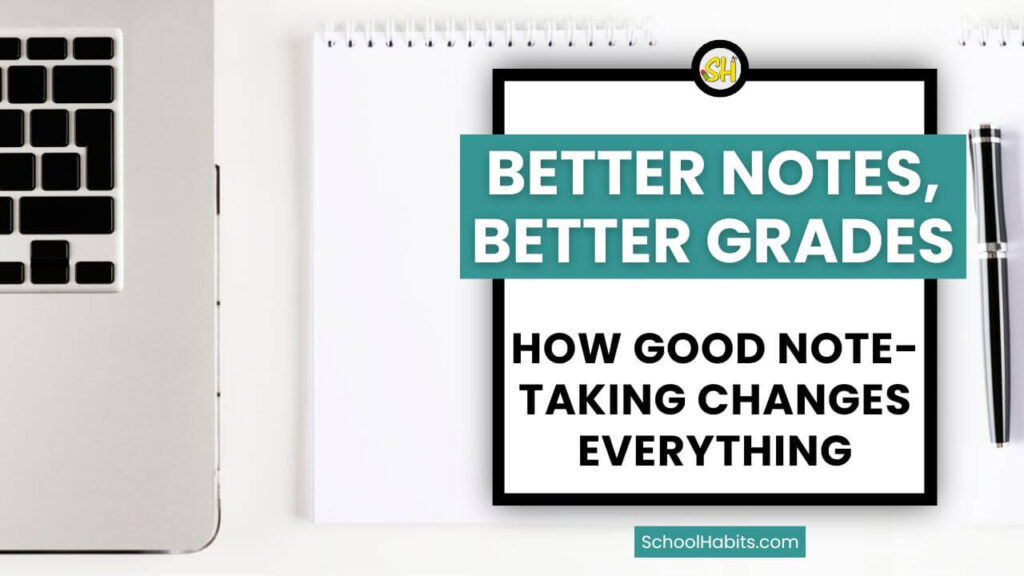
By Katie Azevedo, M.Ed.
Getting good grades in school is about way more than being smart. In fact, being smart doesn’t have much to do with it.
Students with the highest grades tend to have the most efficient systems for doing school. When your systems are locked in, school becomes so much easier because you’re free to focus on the content.
On the other hand, if you’re disorganized, can’t take notes, don’t know how to study, and don’t manage your time well, learning the content becomes so much harder, or even impossible in some cases.
The six most critical systems for students to master are task management, time management, note-taking, annotating, study skills, and organization.
But one of these six pillar skills is at the core of it all. And when you lock in this one skill, the other five become that much easier. And you become unstoppable.
Notetaking.
When you know how to take, organize, and use effective notes, you’re laying a direct path to better grades.
In other words, fixing your notetaking system is the simplest way to do better in school.
What Happens When You Don’t Know How to Take Good Notes
When you don’t know how to take good notes, you can end up in a lot of trouble. The following scenarios may be familiar:
- You spend all your time trying to copy down everything your professor says, which means you can’t even follow along with what the professor is saying.
- You end up with a notebook full of notes you don’t understand because they’re missing information or are super disorganized.
- You have nothing good to study because your notes are junk.
- If you copy your friend’s notes or just use the teacher’s slides, you’re doing nothing to learn the material, which means you have to study it longer to learn it. (Nobody wants that.)
- Or you have absolutely no idea what to write down so you don’t write anything. And then you’re in a real pickle because what the heck are you going to study?
How Good Note-Taking Leads to Better Grades
Knowing how to take notes in lecture classes leads to better grades for several reasons. Let’s talk about three.
1. Improves Comprehension in the Moment
Taking notes the right way during class helps you learn the material from the moment you hear it. This means you ignite the learning process on a neurological level as you write your notes down.
When you don’t know how to take notes, you’re writing down incomplete, overly complicated, or inaccurate information. This destroys the learning process because you start encoding (learning) the wrong things.
But a good note-taking system means that as you’re writing down information in class, you’re already starting to process it. This means you’ll have to spend less time studying it down the road.
When you take notes the way I teach in my College Note-Taking Power System program, you’re capturing just the right information – not too much; not too little – and formatting it in a way that lets your brain immediately see the connections between concepts.
You may not think this is a big deal, but it is.
2. Makes It Super Easy to Study
When you begin a study session, you shouldn’t be scrambling to figure out what to study. That should be handled ahead of time. Instead, your study time should be spent using active recall study strategies.
If you don’t have good notes, you’re missing one of the most useful sources of information to turn into study guides, quizzes, and flashcards.
And when you don’t have this information in the form of good class notes, you waste your precious study time with passive study techniques that do not work.
Note: Passive study techniques are dangerous because they look and feel like studying, but they do absolutely nothing to get information into your head.
As much as I want to tell you that every word your professor says in class is valuable, that’s not true. And if you don’t have an effective note-taking method, you’re more likely to try to write everything down because you think it’s all important. You don’t have time for that.
When you know how to take notes using my two-part College Note-Taking Power System, you learn how to identify the most important information to write down. As a result, you don’t waste your time studying the wrong things.
3. Makes Big Assignments Way Easier
When you have solid notes, homework assignments are easier. When it comes to big assignments like papers or projects, good notes make it easier to find the exact examples or concepts you need, without digging through random Google Docs or messy notebooks, or scrolling through lecture slides posted somewhere in your portal.
If you take notes in a particular structure, they actually become useful to you … as in, you can use them to do your work. If you’re notes don’t help you, they’re useless.
Strong notes also support the other core systems that help you kill it in school:
- You stay organized because you know where everything is.
- You save time because you don’t have to redo work or track things down.
- You manage tasks better because your notes are already broken into chunks you can review in short intervals (yep, top students do this).
- You study smarter because your notes aren’t stuffed with every word the teacher said in class, so you can spend time studying the right things.
Characteristics of a “Powerful” Note-Taking System
A good note-taking system doesn’t have anything to do with where you take your notes or whether you type them or write them. If you’re looking for tips about that, here’s where I talk about the pros and cons of digital vs. paper notes.
However, a good note-taking system has some key characteristics no matter how you’re taking your notes or where you’re storing them:
Consistency
A powerful note-taking system works best when it’s used the same way across all your classes. It should feel automatic and repeatable, not something you have to rethink every time you open your notebook or laptop. You can vary up your formatting (which I give you templates for with the Subject Notes Power Pack bonus that comes with the College Note-Taking Power System), but your general system should be consistent.
Clarity
Your notes should make sense when you come back to them later. That means using clear and simple language, legible handwriting or clean formatting, and adding labels, headings, or cues to help you navigate quickly. That’s what makes my two-part note-taking system so effective: it shows you how to make your notes super clear.
Structure
Whether it’s bullet points, indentations, section headers, or columns, good notes follow a structure that supports how our brains like to learn new information. This structure makes it easier to review and convert into study materials later.
Review System
Taking notes isn’t the end of the process. A solid note-taking system includes a built-in method for reviewing what you wrote down so you don’t have to study it all in one chunk when you’re most stressed out (the night before the test).
Flexibility for Different Class Types
Taking notes in a fast-moving lecture class is very different from taking notes in a discussion-based or hybrid class. A great system adapts to various environments, giving you strategies for each scenario so you’re not winging it and hoping you capture the right material.
Your Next Step
If your notes aren’t helping you study — or worse, they’re making you more confused — then you need a better system. Inside the College Note-Taking Power System, I teach you exactly how to take better (faster!) notes in any class, on any topic, and how to use those notes to learn the material.

Note-taking is not just about writing things down. It’s about learning better, stressing less, and finally getting your notes right so everything else gets easier.

